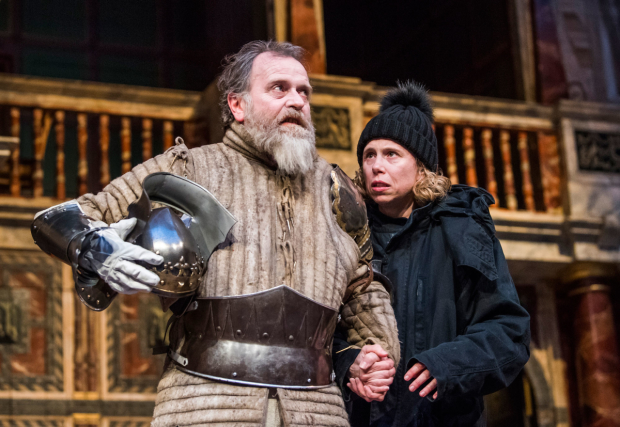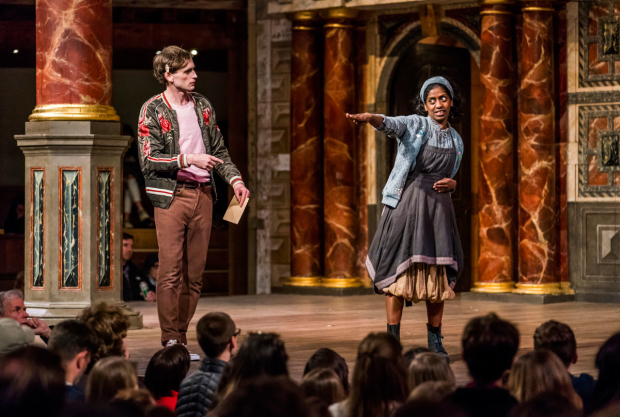Review: As You Like It and Hamlet (Shakespeare's Globe)
Michelle Terry opens her first season as artistic director with in-rep productions of Hamlet and As You Like It

©Tristram Kenton
As You Like It ★★★★ / Hamlet ★★
The sun shone at the start of the actress Michelle Terry's opening day in charge of Shakespeare's Globe. The auguries were good.
Following Emma Rice's controversial directorship, Terry's regime was almost ridiculously well-intentioned: keeping the best of Rice's innovations such as gender, colour and disability blind casting, banishing the excessive lighting and radical interpretations that had so disturbed the board, adding such warm-hearted extras as open rehearsals and a process in which the ensemble contribute ideas as much as the directors.
The results were on view in a lengthy double bill performed by the same group of 12 actors: an afternoon showing of As You Like It followed by an evening performance of Hamlet, both written in 1599, around the same time as the original Globe opened. Terry herself took the title role in Shakespeare's tragedy, and the gender neutrality continued throughout both casts with Jack Laskey taking the leading female role of Rosalind. Ophelia was played by a man, Shubham Saraf, Orlando by the female Bettrys Jones.
The design for both productions, by Ellan Parry, was a dressing-up box hotch-potch, pilfering the Globe's archive and the actors' own wardrobes to create a timeless, relaxed vibe. The stage is bare. The music by James Maloney, played by musicians in the onstage gallery, was period with the odd contemporary chord. The directors are the relatively inexperienced Federay Holmes and Elle While, working together on both plays, with no overall concept imposed on either.
In As You Like It, the random nature of the results paid off. The comedy, of courtiers on the run in the Forest of Arden, isn't illuminated or particularly well-spoken, but it has an energy that carries it through. The boldest decision – to cast the Deaf actor Nadia Nadarajah as Celia, speaking her lines in British Sign Language – is inspirational, animating the entire production. She is a wonderful, expressive actress and the vitality of her gesture, the way that Laskey's Rosalind interacts with her, signing back to her and sometimes speaking for her, creates between them a bond of love and affection that almost turns the play into the Rosalind and Celia show. The one moment she speaks, forced into sound by wanting to oppose Rosalind's banishment is deeply moving.
Together they build something rather brilliant; Laskey is a gifted physical actor and he has great fun swooning round the stage vigorously. There's pleasure to be had too in the physical disparity of his height and his love for Jones' tiny, fiery Orlando. Helen Schlesinger convinces as the banished Duke, Pearce Quigley makes an unusually funny and melancholy Jacques, initially falling over the 'seven ages of man' speech while chomping on a banana, Catrin Aaron, Richard Katz and James Garnon all contribute a number of lively cameos.
You notice some slightly unsettling things. The freshness of the interactions means that the use of the stage space is often bizarre. People get stranded near the pillars; the blocking is peculiar. The designs veer all over the place, from a puppet deer apparently made of bandages to Hymen in a tatty giant wedding dress. But the sheer charm of it all is beguiling.

©Tristram Kenton
Around the edges of the action, Terry, playing the old retainer Adam, a love-lorn shepherd, a noble lord, reveals a charisma and a vigour that make you look forward to her performance as Hamlet. But then the wheels come off.
If ever there was an argument for director's theatre it is this production of Hamlet which is so muddled, so various in style, so completely incoherent in action, that Terry finds herself beached in the centre with nowhere to go. Each speech has clarity and a line of thought; she is a compelling presence. But I have no idea who her Hamlet is, or what he is up to at any given point. There is no reading and the almost improvisatory, 'let's put the show on right here' qualities that have swept the company through the comedy, leave the tragedy spilling across the stage like a deflated pudding.
The costumes don't help. Terry really does affect an antic disposition, coming on like a white-faced Pierrot from a 1970s poster. I defy anyone to make anything of "To be or not to be" while wearing such a garb, with a painted clown's mouth. Around her, the actors who have shone (Laskey, Nadarajah, Quigley) are pushed to the side and those who are left seem to run out of air and vitality leaving the second half, in particular, struggling to a close.
Maybe the company has simply bitten off too much. But it is a shame. There is great goodwill for Terry and her plans, but she needs to find more than good intentions and youthful exuberance if this space is to resonate with meaningful work.


















